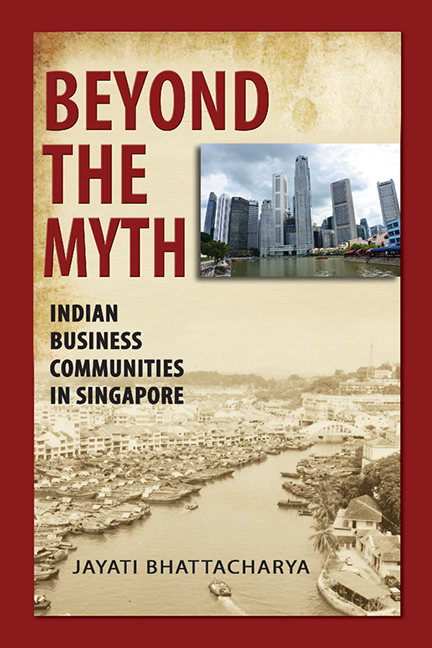Book contents
- Frontmatter
- Dedication
- Contents
- List of Map, Tables and Figures
- Message by Mr R. Narayanmohan
- Foreword by Professor Tan Tai Yong
- Message by Ambassador K. Kesavapany
- Acknowledgements
- List of Abbreviations
- Introduction
- PART ONE
- PART TWO
- Conclusion: Surging Forward
- Appendices
- Select Bibliography
- Index
- About the Author
Message by Ambassador K. Kesavapany
Published online by Cambridge University Press: 21 October 2015
- Frontmatter
- Dedication
- Contents
- List of Map, Tables and Figures
- Message by Mr R. Narayanmohan
- Foreword by Professor Tan Tai Yong
- Message by Ambassador K. Kesavapany
- Acknowledgements
- List of Abbreviations
- Introduction
- PART ONE
- PART TWO
- Conclusion: Surging Forward
- Appendices
- Select Bibliography
- Index
- About the Author
Summary
In mid-2007, Dr Jayati Bhattacharya had approached me with this research proposal. It looked like a difficult proposition in view of the limited available sources on the subject. Gradually, as she began exploring different avenues for source materials, we had further discussions and the proposition looked feasible. What has been achieved is an analysis of the broad history of Indian business communities in Singapore spanning roughly over a century and a half. The book is the coordination and contextualization of the thoughts and ideas of the participating businessmen and entrepreneurs who have lived through different phases of Singapore's modern history. It is to Dr Bhattacharya's credit that she has ventured into an area that none had done so in the past. A book-length study of this kind has not been attempted before.
In recent decades, especially with the dawn of the new century, Singapore-India relations have attained new heights with an intensity of bilateral exchanges on the political, economic and social fronts. Against this background, a study of the different aspects of the multi-dimensional facets of Singapore-India relations could not have been more opportune. The signing of the Comprehensive Economic Cooperation Agreement (CECA) has further catapulted the volume of bilateral trade.
If Indian liberalization programmes in the 1990s has ushered immense opportunities of development for Indians, both on their home ground as well as abroad, Singapore has ably managed to attract a large pool of professional and entrepreneurial talent to enhance its status as a knowledge-based economy. Singapore has also served as a base for Indian companies to expand their venture into the Asia-Pacific region. As such, the complementary policy initiatives of both the states have been advantageous to business communities on both sides and have catalyzed and contributed to the “rising Asia” phenomenon. These changing paradigms of thought and action have been addressed in this research work. This book could pave the way for further research on lesser-known aspects of such linkages and connectivities in Southeast Asia.
ISEAS is happy to support this work by a young scholar from India now settled in Singapore with her family.
- Type
- Chapter
- Information
- Beyond the MythIndian Business Communities in Singapore, pp. xvii - xviiiPublisher: ISEAS–Yusof Ishak InstitutePrint publication year: 2011



